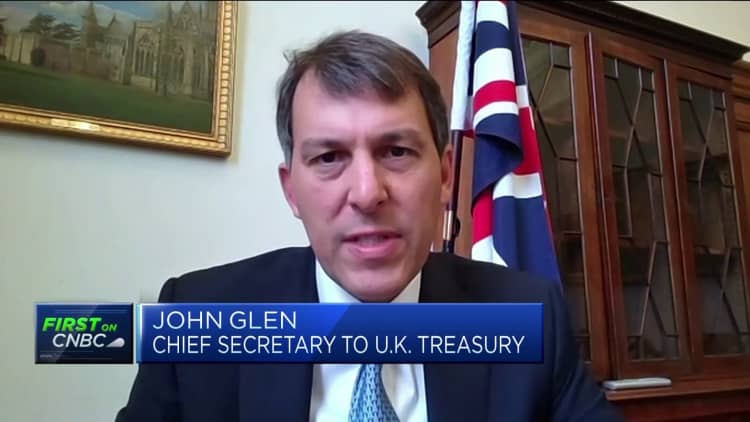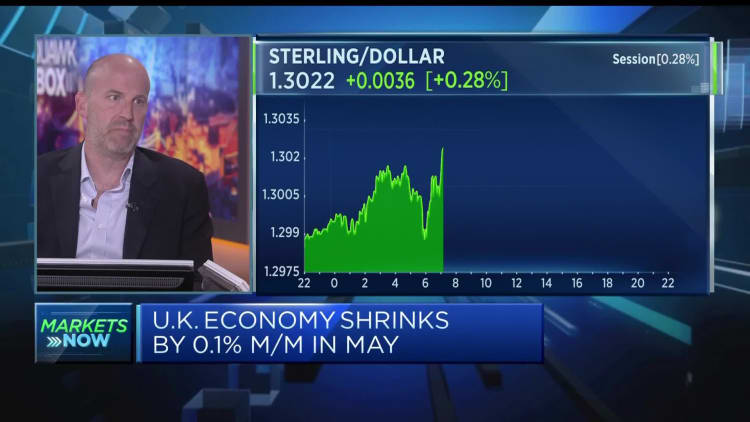UK inflation rate slides to 7.9% in June, below expectations

Skyline view of the City of London financial district.
Mike Kemp | In Pictures | Getty Images
LONDON — U.K. inflation cooled significantly in June, coming in below consensus expectations at 7.9% annually.
Economists polled by Reuters had projected an annual rise in the headline consumer price index of 8.2%, following May’s hotter-than-expected 8.7% reading, but annualized price rises continue to run well above the Bank of England‘s 2% target.
On a monthly basis, headline CPI increased by 0.1%, below a consensus forecast of 0.4%. Core inflation — which excludes volatile energy, food, alcohol and tobacco prices — remained sticky at an annualized 6.9%, but fell from a 31-year high of 7.1% in May.
Falling prices for motor fuel made the largest downward contributions to the monthly change in the CPI annual rate, the Office for National Statistics said Wednesday. Food prices rose in June, but by less than in the same period of last year.
“There were no large offsetting upward contributions to the change in the rate,” the ONS added.
Sterling slid 0.6% against the dollar on Wednesday, hovering around $1.296 as of 7:50 a.m. London time.
Chief Secretary to the Treasury John Glen told CNBC on Wednesday that the larger-than-expected decline in the inflation rate was “very encouraging.”
“But there’s no complacency here in the Treasury,” he added. “We’re working closely in lockstep with the Bank of England as we try to halve it this year and get it down to its long term norm of 2%.”
The U.K. has endured persistently high inflation that both the government and the Bank of England have warned could become entrenched in the economy, as a cost-of-living crisis and a tight labor market fuel wage price increases.
Bank of England Governor Andrew Bailey and U.K. Finance Minister Jeremy Hunt told an audience in the City of London earlier this month that high wage settlements were harming their efforts to contain inflation.
The Organization for Economic Cooperation and Development last month projected that the U.K. will experience the highest level of inflation among all advanced economies this year, with a headline annual rate of 6.9%.
The Bank of England implemented a bumper 50-basis-point hike to interest rates last month, its 13th consecutive increase, as the Monetary Policy Committee struggles to quash demand and rein in inflation.
After the U.K. base rate went from 0.1% to 5% over the last 20 months, markets are narrowly pricing in another aggressive half-point hike to 5.5% at the MPC’s August meeting.
A ‘glimmer of light’
Although energy and fuel prices are taking headline inflation in the “right direction,” stubbornly high core inflation and food costs mean Wednesday’s print is unlikely to offer any “real relief to struggling households and businesses,” said Suren Thiru, economics director at the Institute of Chartered Accountants in England and Wales.
“June’s decline in inflation should be followed by a hefty fall in July, with lower energy bills – following the reduction in Ofgem’s energy price cap – likely to pull the headline rate below 7%,” Thiru said in a statement.
He added that core inflation should continue to trend downwards, as the lagged effects of the Bank of England’s monetary policy tightening and the government’s tax increases squeeze demand. He nevertheless warned this will come “at the expense of a notably weaker economy and higher unemployment.”
“While interest rates will probably rise again in August, focusing too much on current inflation data to set rates can lead to damaging policy mistakes given the long time lag between rate rises and their effect on the wider economy,” Thiru said.

Marcus Brookes, chief investment officer at Quilter Investors, said that the fall in CPI represented a “glimmer of light,” but “still leaves us wondering once again why the U.K. is such a drastic outlier” among major economies when it comes to inflation.
“Demand has withstood both inflation and the rise in rates, but cracks are appearing, and as more mortgage holders get exposed to the current rates, the economy is likely to be hit as a result.”
Brookes noted that this path to a likely recession next year may be necessary in order to get inflation back to target, with the Bank of England raising rates further and with fiscal tightening unlikely, as the government faces an election in 2024.
“Inflation should begin to come back down to more palatable levels soon, but as we have seen these forecasts are unpredictable,” he added.
“For investors, this means seeking shelter in quality companies that can navigate this difficult environment, while also considering U.K. fixed income investments, such as gilts, as these look at attractive prices right now as we head into a potentially difficult economic period.”
